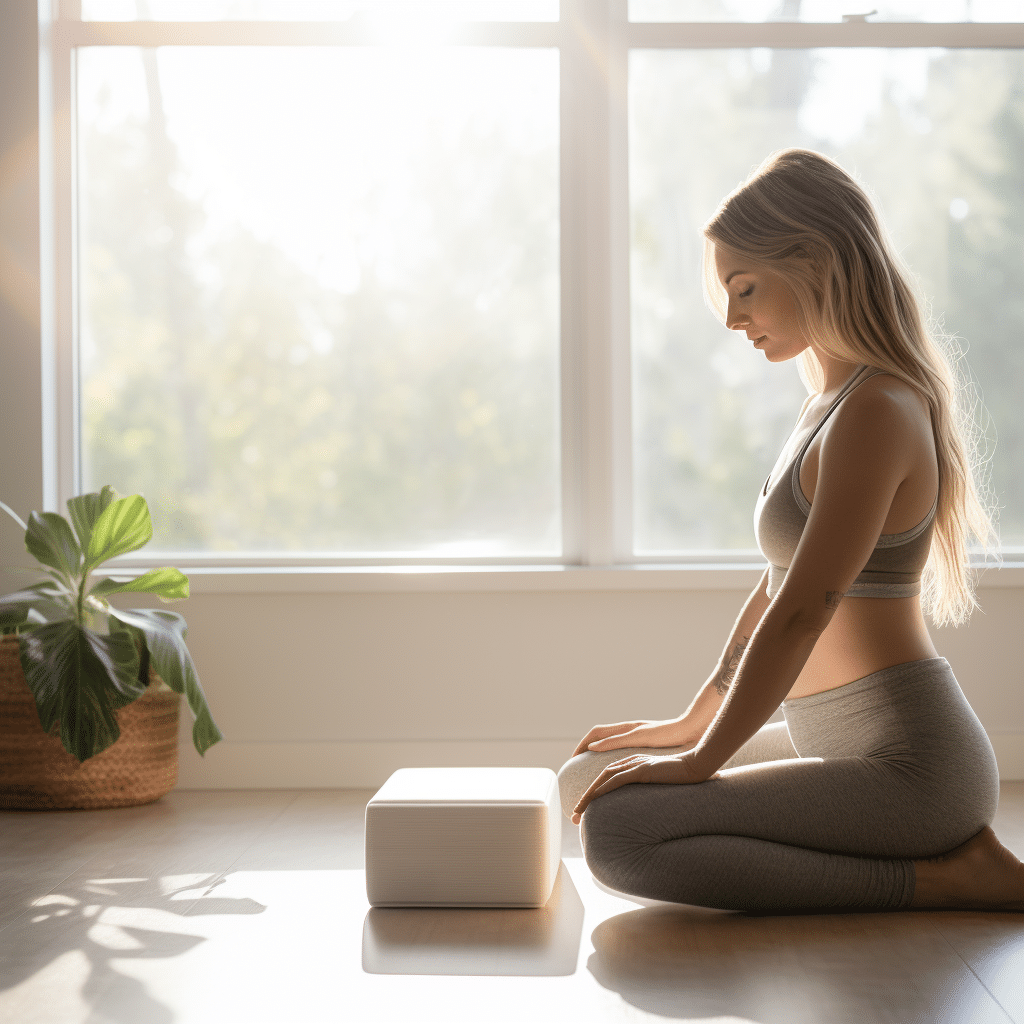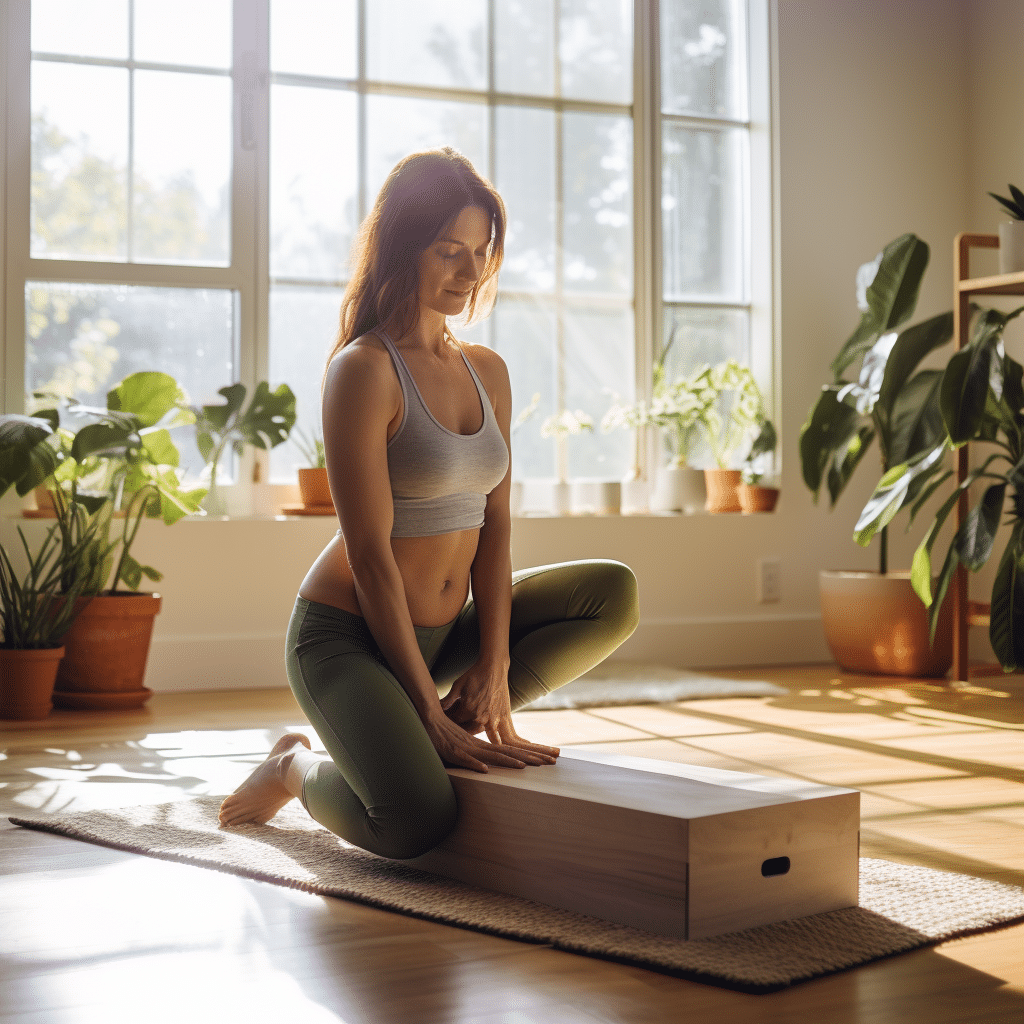Introduction – Eco-Friendly And Sustainable Yoga Blocks
The yoga industry is no exception to the trend of offering more eco-friendly products for practitioners to support their personal health and reduce their impact on the environment. One such product is the eco-friendly yoga block, which is becoming increasingly popular. This guide offers insights into various sustainable yoga blocks, their benefits, tips for choosing the best one for your needs, and importantly, recommendations for products that satisfy one or more eco-friendly requirements.

Eco-Friendly Yoga Blocks: Materials and Benefits
A diverse range of materials are used to create eco-friendly yoga blocks. Four of the most popular materials on the market are bamboo, cork, recycled EVA foam, and natural rubber. Each of these has its unique benefits and features that set them apart from traditional yoga blocks. By using these sustainable options, you’re not only supporting your physical health but also play a role in reducing your carbon footprint.
In more depth, the benefit of these materials are as follows:
Bamboo: Bamboo is an extremely fast-growing and sustainable plant. Bamboo yoga blocks are sturdy, durable, and lightweight, which makes them a popular choice for many yogis. They have a natural and smooth finish, providing excellent grip and comfort during your practice. Since bamboo is naturally anti-microbial, these blocks are also highly hygienic. The use of bamboo supports the reduction of deforestation and helps maintain biodiversity.
Cork: Cork is harvested from the bark of cork oak trees, which means the trees aren’t cut down in the process, making this a highly sustainable option. Cork yoga blocks have a firmness not found in foam counterparts, offering superior support. They have a natural texture that provides extra traction, which can be especially beneficial during hot yoga sessions as they become more grippy with sweat. Cork is also naturally anti-microbial, repelling mold and mildew.
Recycled EVA Foam: Ethylene-vinyl acetate (EVA) is a type of plastic that’s often used for yoga blocks. When sourced responsibly, it can be recycled and turned into new products, which is the case with recycled EVA foam yoga blocks. These blocks are lightweight and durable, often featuring high-density foam for added support. They are typically softer than cork or bamboo blocks, which some practitioners prefer. By choosing recycled EVA foam, you’re helping to reduce the amount of plastic waste that goes into landfills.
Natural Rubber: Natural rubber is harvested from rubber trees in a sustainable manner. These yoga blocks offer excellent grip and are often denser and heavier than blocks made from other materials, providing solid support. They’re ideal for those who want a little extra stability during their practice. Opting for natural rubber yoga blocks supports the reduction
Environmental Benefits
Eco-friendly yoga blocks provide various environmental benefits compared to their traditional counterparts. Some of the key advantages include:
1. Biodegradable materials and reduced waste: Blocks made from bamboo, cork, and natural rubber are biodegradable, meaning they will break down over time without causing harm to the environment.
2. Reduced carbon footprint during the production process: Sustainable sourcing and manufacturing processes create a smaller carbon footprint. For example, cork production is a renewable process as it involves the removal of the bark rather than cutting down the cork oak tree.
3. Sustainable sourcing: The materials used in these blocks are often sourced from certified sustainable forests or recycled materials, promoting responsible use of resources.
Personal Health Benefits

When it comes to practicing yoga, personal health is paramount. By choosing eco-friendly blocks, you reap the following health benefits:
1. Non-toxic materials: Many traditional yoga blocks are made from PVC, which can release harmful chemicals. Sustainable alternatives like cork and bamboo are non-toxic, making them safer for you and the environment.
2. Hypoallergenic options: Some sustainable materials, such as cork, are naturally hypoallergenic, making them suitable for individuals with allergies or sensitivities.
3. Enhanced grip and support: Materials like cork and natural rubber provide better traction and support during yoga practice, increasing stability and comfort.
Incorporating Eco-Friendly Yoga Blocks into an Environmentally Conscious Lifestyle
In addition to selecting eco-friendly yoga blocks, consider expanding your environmentally conscious choices to other facets of your yoga practice. Look for eco-friendly yoga mats, straps, and bags made from sustainable and organic materials, such as jute, organic cotton, or TPE (thermoplastic elastomer). Supporting brands like Manduka and Gaiam that emphasize sustainability in their product lines can also contribute to a greener future.
Eco-Friendly Yoga Block Review And Recommendations – Eco-Friendly Yoga Blocks
1. Manduka Yoga Blocks
The Manduka Recycled Foam Yoga Block is an eco-friendly and high-performance yoga accessory.
Materials and Sustainability: This yoga block is made from between 50% to 75% recycled post-industrial and post-consumer EVA foam, marking it as a highly sustainable choice. This means that it utilizes EVA foam that would otherwise be waste from industrial processes or used consumer products. As a result, it helps reduce the amount of waste that goes to landfills and lowers the demand for new plastic production, aiding in the conservation of resources and reduction of pollution.
Size and Weight: The block is lightweight at just 1 lb and measures 4″ x 6″ x 9″, making it portable and easy to handle during your yoga practice. It fits comfortably in your hands and is easy to carry in a yoga bag or backpack.
Comfort and Durability: The high-density foam offers firm support, providing stability during challenging poses and stretches. The block is extremely durable, thanks to its high-quality materials and solid construction. The radius edges offer added comfort, giving it a smooth finish that won’t cause discomfort or distraction during your practice.
Grip and Aesthetics: This block also features a soft, comfortable grip that is slip-resistant, providing a secure hold even during intense sessions. Its stylish design and attractive Elderberry color add a touch of sophistication to your yoga gear.
Price and Purchase Terms: Priced at $22.00, or 4 payments of $5.50, it offers value for money given its quality and sustainable features. Plus, there’s free shipping for orders over $150 and a 30-day return policy.
2. Hugger Mugger Recycled Foam Yoga Block
The Hugger Mugger Recycled Foam Yoga Block is a reliable and eco-friendly yoga accessory designed to support and enhance your practice. It’s worth noting that the block is latex-free, an important factor for individuals with latex allergies. However, always consult your doctor before starting any exercise program, as stated in the product description.
Materials and Sustainability: The block is made from recycled EVA foam, demonstrating a commitment to sustainability. By using recycled materials, Hugger Mugger contributes to waste reduction and promotes the circular economy. Moreover, the block is recyclable, further enhancing its eco-friendly properties.
Size and Weight: This block weighs just 0.8 lb and measures 4″ x 9″ x 6″, which makes it highly portable and easy to handle. Its lightweight nature makes it an excellent choice for those who travel with their yoga gear or practice yoga in different locations.
Comfort and Durability: The block’s dense and strong foam provides reliable support during various yoga poses, especially the ones requiring extra stability. Slightly firmer than regular foam yoga blocks, it ensures a solid and steady base for your practice. Its beveled edges add to the comfort, preventing any sharp or uncomfortable edges from interrupting your yoga session.
Grip and Aesthetics: The block’s firm structure allows for a stable grip, ensuring the block stays in place during your practice. Its simple design focuses on functionality over aesthetics.
Price and Purchase Terms: Although the price is not listed, the product description highlights that the block is economical, suggesting that it offers excellent value for its price.
3. Gaiam Cork Yoga Brick
The Gaiam Cork Yoga Block is an exceptional choice for environmentally conscious yoga practitioners seeking support and flexibility in their yoga practice.
Materials and Sustainability: This yoga block is constructed from 100% all-natural recycled cork, demonstrating a strong commitment to sustainability. Using recycled cork not only decreases environmental impact, but also enhances the durability and grip of the block. Choosing this block means supporting the recycling industry and encouraging sustainable practices.
Size and Weight: While the weight is not specifically listed, cork blocks are typically lightweight and manageable. The block’s dimensions are 9″W x 5.5″H x 3″D, making it portable and easy to maneuver during yoga sessions.
Comfort and Durability: The Gaiam Cork Yoga Block is characterized by its comfortable and pliable structure, offering excellent grip and traction. The use of cork as a material lends to its durability, ensuring that the block will withstand regular use over time. Its rounded edges provide additional comfort, reducing the risk of discomfort during your practice.
Grip and Aesthetics: The block’s cork material provides excellent grip, ensuring stability during even the most challenging yoga poses. In terms of aesthetics, the natural look of the cork offers a minimalist and earthy feel.
Use and Benefits: This block is designed to provide support during difficult poses and enhance reach and flexibility. It’s an excellent tool for those who might struggle with flexibility, aiding them in achieving poses that might otherwise be challenging. For more advanced yogis, it can serve to extend the stretch of some poses.
Price and Purchase Terms: The Gaiam Cork Yoga Block is priced at $14.98, making it an economical choice given its high quality and sustainable material. Customer satisfaction seems high, as indicated by a rating of 4.79 stars, but as always, individual reviews would provide a more nuanced understanding of user experiences.
Tips for Choosing the Right Eco-Friendly Yoga Block
When deciding upon an eco-friendly yoga block, consider the following factors:
1. Material preference and personal health concerns: Assess your personal preferences, health, and any allergies or sensitivities to specific materials before selecting a yoga block.
2. Support and durability: Evaluate how much support you need during your practice and whether a firmer or softer material would be more appropriate for your needs.
3. Environmental impact and sustainability: Look for products from brands that emphasize eco-friendliness, carbon reduction, and responsible production, such as Manduka and Hugger Mugger.
Conclusion – Eco-Friendly Yoga Blocks
Incorporating eco-friendly yoga blocks into your practice isn’t merely a trend but a long-term positive impact on your personal health and the environment. Choosing sustainable yoga gear, such as Manduka’s Cork Yoga Block or Hugger Mugger’s Bamboo Yoga Block, will allow you to make informed choices for your practice while doing your part in protecting the planet.
